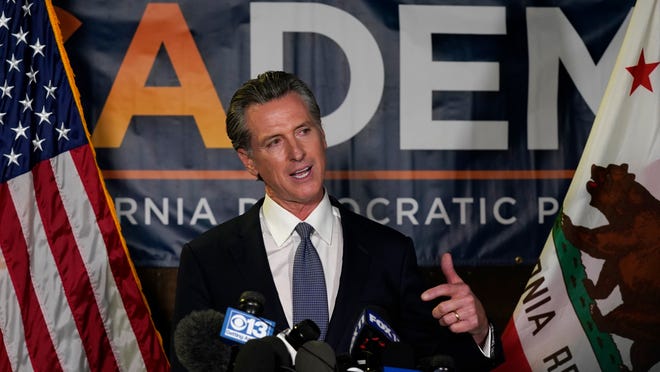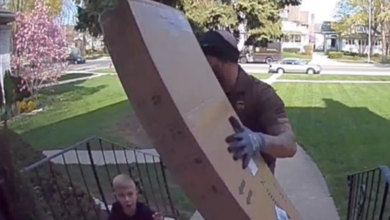
- In 2003, when Democratic Gov. Gray Davis was recalled, Republicans made up 35% of the state’s voters; today, they account for 24%.
- Of the roughly 9.1 million total ballots cast, Larry Elder was the top Republican vote-getter, receiving just 26% of the vote.
- The recall election that wrapped up Tuesday came at a substantial cost to taxpayers – $276 million, according to state estimates.
The attempt to recall California Gov. Gavin Newsom failed by an overwhelming margin Tuesday, and several dynamics – the ongoing COVID-19 pandemic, a lack of viable replacement candidates and a shrinking Republican base – played in the first-term Democrat’s favor, positioning him well for reelection in 2022.
While some votes were still being processed, statewide figures on Wednesday showed 63.9% of California voters rejected the recall – an even higher share of the vote than what Newsom got when first elected in 2018. In that race, Newsom garnered 61.9% of the vote.
Several factors explain Newsom’s overwhelming victory, none more than the sinking number of registered Republican voters in the state. In 2003, when Democratic Gov. Gray Davis was recalled, Republicans made up 35% of the state’s voters; today, they account for 24%.
“First, (Newsom’s victory) was just a matter of math,” said Garry South, who managed successful campaigns for Davis in 1998 and 2002 and remained involved during his recall campaign. “In the 2003 recall, Democrats had only an 8.4-point registration advantage over Republicans … but let’s get real: Democrats today have a 22.4% registration advantage over Republicans – almost three times as high.”
Subscribe for free: Get USA TODAY's On Politics newsletter in your inbox
A handful of polls ahead of this year’s recall found Republicans were more motivated to vote than Democrats – a factor South argued was blown out of proportion, particularly given the makeup of the electorate.
“Of course (Republicans) were more enthusiastic, because they were trying to kill the king,” South said. “All Democrats have to do is protect the status quo, so obviously there’s going to be a difference in enthusiasm. Why would a Democrat be enthusiastic about a recall targeting their own governor?”
COVID-19 policies boost Gov. Gavin Newsom in California recall
In the final weeks ahead of Election Day, Newsom and his supporters increasingly framed the recall as a fork-in-the-road moment amid the ongoing COVID-19 pandemic. The move appears to have paid off.
“'No' is not the only thing that was expressed tonight," Newsom said Tuesday night after multiple news outlets called the election in his favor. “I want to focus on what we said ‘yes' to as a state: We said yes to science, we said yes to vaccines, we said yes to ending this pandemic.”
President Joe Biden, who campaigned for Newsom in Long Beach on Monday, offered a similar reaction on Wednesday in a statement congratulating the governor on his victory.
“This vote is a resounding win for the approach that he and I share to beating the pandemic: strong vaccine requirements, strong steps to reopen schools safely, and strong plans to distribute real medicines – not fake treatments – to help those who get sick,” Biden said.
Their focus on Newsom's COVID-19 policies makes sense, given recent polling that found six in 10 voters have approved of the governor's approach to the pandemic.
South noted the election's COVID-19 dynamics were somewhat ironic, given Newsom's pandemic policies – as well as his infamous maskless visit to the French Laundry restaurant last winter – fueled the recall getting on the ballot in the first place.
“The recall was all about the pandemic – ‘Oh, he closed down the state, he hurt small businesses, he closed the schools’ – but the fact of the matter is, during that entire period of time, people actually gave him higher marks for his handling of the pandemic than his overall job rating,” South said. “So, leaning into that was a very smart thing to do.”
Dan Schnur, a former GOP strategist who teaches political communications at USC and UC Berkeley, agreed.
“Voters still have fairly mixed feeling about his time in office, but Newsom successfully painted the Republican alternative as a much worse option,” Schnur said. “As much as he ran against Larry Elder, he also used Republican governors in other states to his advantage.”
Republicans lacked an Arnold Schwarzenegger-type candidate
In contrast to Tuesday’s contest, California’s recall of Davis in 2003 was successful in part because of one specific person on the ballot: superstar movie actor Arnold Schwarzenegger, who announced his candidacy on “The Tonight Show” with Jay Leno. He was then elected governor with more than 4 million votes.
“He instantly became the public face of the recall as the replacement candidate. In the minds of a lot of voters, the race kind of came down to Davis versus Schwarzenegger, and that was not a helpful faceoff for Davis,” South said. “There was nobody of similar standing in this field for Newsom, so he escaped that.”
This year’s race also lacked any established Democratic candidates – a deliberate move by Newsom and party allies to avoid a repeat of the 2003 recall, when Lt. Gov. Cruz Bustamante ran as a replacement option.
The lack of well-known Democrats on the ballot made messaging easier for Newsom and his supporters, who frequently labeled the recall as a Republican power grab.
“Bustamante being in that race allowed a disturbingly meaningful number of Democrats thinking they could have a two-for-one … and replace a Democrat with a Democrat,” South said.
No 'quick fixes' for California Republicans after recall setback
Newsom also benefitted from a lack of candidates who were able to appeal beyond their Republican base.
Elder was by far the leading candidate to replace Newsom, with 46.9% of those who voted on question two selecting the conservative talk show host.
That figure, however, only reflects those who chose to select a replacement candidate. Of the roughly 9.1 million total ballots cast, Elder received just 26% of the vote.
In total, about 45% of voters skipped the replacement question altogether, embracing the approach that Newsom and Democratic Party leaders had been urging for weeks.

Schnur, who worked as the chief spokesperson for GOP Gov. Pete Wilson in the 1990s, noted that Republicans have long been “in a very deep hole” in California, with no GOP officials holding a statewide office since the end of Schwarzenegger’s term.
“After the recall, they’ve dug that hole even deeper,” Schnur said. “Not only are they a very small minority party in the state, but they’re largely controlled by the most extreme voices in their party.”
“In a deep-blue state like California, that’s not a recipe for success,” he added. “One of the lessons to be learned is that there are no quick fixes. You have to build back gradually.”
With California’s 2022 primary less than a year away, South predicted Newsom would easily sail through his reelection campaign, adding that “no credible Democrat” is likely to run against the governor.
“Whichever Republican ends up in the two-way runoff with him is going to get slaughtered,” South said. “It’s not even in doubt, and the recall kind of put the underline on that.”
California legislators consider recall reform after $276M cost to taxpayers
The recall election that wrapped up Tuesday came at a substantial cost to taxpayers – $276 million, according to state estimates. Some officials have already pointed to the price tag as further evidence of the need to reform California’s recall process.
Just hours after Newsom emerged victorious, Democrats in the state legislature said Wednesday that they will push for changes to make it more difficult to challenge a sitting governor.
Those reforms could include increasing the number of signatures necessary to force a recall election, raising the standard to require wrongdoing on the part of the office-holder and changing the process that could permit someone with a small percentage of votes to replace the state's top elected official.
From our editor, to your inbox: Editor-in-chief Nicole Carroll takes you behind the scenes of the newsroom in this weekly newsletter
“We need to create a system where a small, small, small minority of Californians can’t create, can’t initiate a recall that the California taxpayers spent almost $300 million on and that, frankly, distracts and really has an impact on our ability to govern for nine months,” Assemblyman Marc Berman said.
State Sen. Josh Newman, who himself was recalled in 2018 before regaining his seat two years later, separately said he will propose two constitutional amendments: One to raise the number of signatures needed to trigger a recall election and another to have the lieutenant governor finish the governor’s term if a recall succeeds.
The lawmakers' frustrations were shared by some who cast their ballots Tuesday. As he dropped off his ballot in Indian Wells on Tuesday, Dan Graff called the recall effort a "waste of money."
"We're going to have an election in a little more than a year," Graff told The Desert Sun of the USA TODAY Network. "It's not going to change the fact were going to have an election in 2022 ... I think any issues we have, we can deal with then."
Back at the state Capitol, Berman and Sen. Steven Glazer, who head the elections panels in their respective chambers, promised bipartisan hearings in the coming months, with the goal of proposing constitutional changes sometime after lawmakers reconvene in January.
Changes to the recall law could go before voters as early as the November 2022 general election.
Contributing: Maria Sestito and Eliana Perez, The Desert Sun; The Associated Press
Tom Coulter covers politics in California and the Coachella Valley. He can be reached at [email protected] or on Twitter @tomcoulter_.











